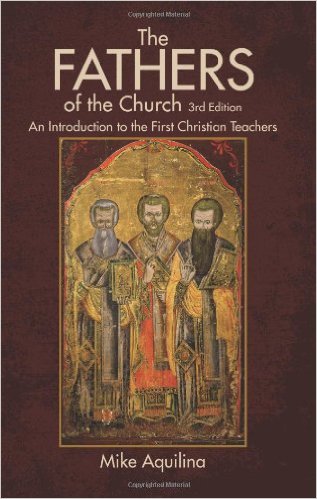We
read The Fathers of the Church: An Introduction to the First Christian Teachers by
Mike Aquilina at our parish Bible class this past year.
This was my first year with the Bible group, and to my surprise they don’t
just read the Bible. What the group
typically does is read a book and meet once a week to discuss it. The read seems to run about nine months. The summer is off.
You
have probably seen Mike Aqulina on EWTN, and his expertise is the
patristics. The following is my review
of the book at Goodreads.
This is a solid book that
surveys the Church Fathers (and a few Mothers too) from the very early days -
shortly after the New Testament documents were written (first century) to the
eighth century. It spans St. Clement of
Rome, who was probably a disciple of St. Peter, to St. John of Damascus, who
was part of the refutation of the iconoclastic heresies in the eighth
century. There are fifty-four different
Church Fathers represented, and what is particularly excellent is the
background information. Where the Acts
of the Apostles leaves off, the Church Fathers pick up to provide the history,
theology, and apologetics of Christian thinking. Aquilina states:
"As heirs to the
Apostles, the leaders and teachers of the early Church - the Fathers of the
Church - were intensely concerned with preserving the unity and integrity of
the "company of those who believed," even as that company grew from a
small band of several hundred to encompass millions of people speaking dozens
of languages and dispersed throughout the Roman Empire."
Aquilina discusses each
of the Fathers and provides excerpts of key texts and important biographical
information. Take for instance the first
paragraph on St. Polycarp of Smyrna:
"St. Polycarp (c.
69-155) could be called the most well-connected man in the ancient Church. At one end of his long life, he was a young
disciple of St. John the Apostle. At
middle age, he was a bishop-colleague of St. Ignatius of Antioch. As an old man, he was master to the young boy
who would grow up to be St. Irenaeus of Lyons.
By his longevity, St. Polycarp was able to teach many how to live as the
Apostles had taught him to live. By his
death as a martyr, at age eighty-six, he taught generations of persecuted
Christians after him how to die."
Aquilina concisely
explains the shifting political situations as the centuries roll by and the key
arguments and heresies of the times. He
provides a handy list of the councils and the evolution of the creeds. Mostly Aqulina lets the Fathers speak in
their own voice. All the well-known
fathers are represented: St. Ignatius of Antioch, St. Justin Martyr, St.
Irenaeus of Lyons, Origen, St. Anthanasius, St. Basil, St. Gregory of Nazianus,
St. Gregory of Nyssa, and so on. I can't
name them all, but it includes both east and west traditions. It also includes many that are less well
known, ones I never heard of: Hermas, Lactantius, St. Pacian of Barcelona, St.
Ramanus the Singer, Theodore of Mopsuestia.
What kind of works are
represented? We see in the writings all
the Church doctrines we have now. We
have an excerpt of St. Aristedes of Athens' apologetic letter to the
Greco-Roman pagan (actually addressed to the Emperor Hadrian) world explaining
the nature of the Christian deity. Then
in a different era with Christianity now the prominent religion, we have St.
Ambrose's letter to his emperor explaining how it was out of place for him, a
secular leader, to intrude on Christian doctrine. We have a nativity hymn composed by St.
Ephrem of Syria in the middle of the fourth century and a Christmas carol from
Prudentius composed a century later. We
have from St. Irenaeus in the second century a discourse on Mary as the new Eve
and from St. Jerome in the fourth or early fifth centuries on Mary's perpetual
virginity. We have from St. Basil
"On the Holy Spirit" and from St. Augustine "On the
Trinity." We have recounts of
martyrdoms from an anonymous letter recounting the martyrdom of St. Polycarp,
from St. Perpeuta herself leading up to her martyrdom, and the heroic martyrdoms
witnessed by St. Dionysius the Great. We
have refutations of heresies from St. Ignatius of Antioch, St. Irenaeus, St.
Clement of Alexandria, and others. We
have pastoral texts on how to live the Christian life, how to understand the
Church and the sacraments, and how to read and understand sacred
scripture. What we have in these
excerpts is the complete faith in microcosm.
This is a handy reference
for one's bookshelf. If not this book,
you should have one just like it.
I gave the book four stars I think. I
enjoyed the read and the discussions at the Bible class. I’m looking forward to next year’s read.


No comments:
Post a Comment